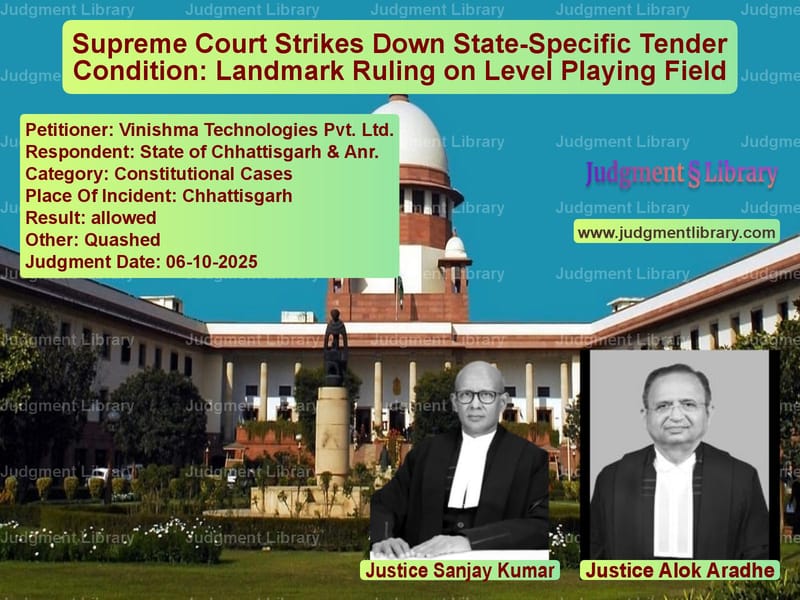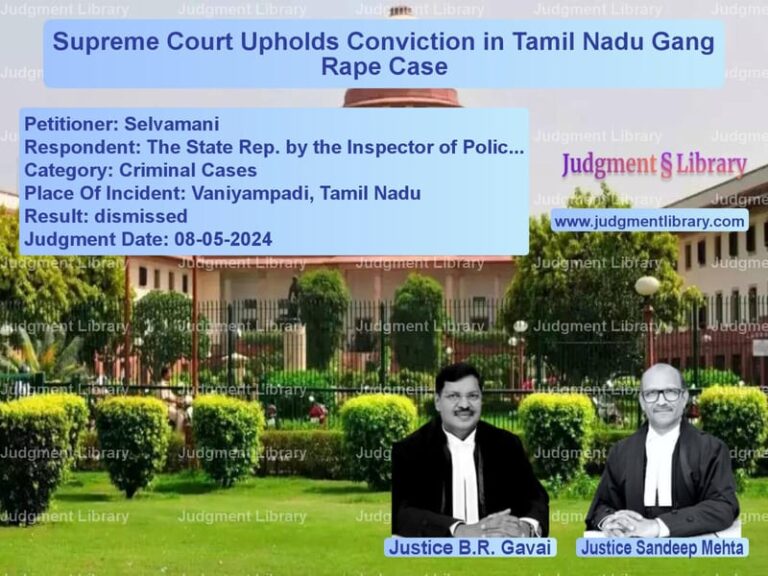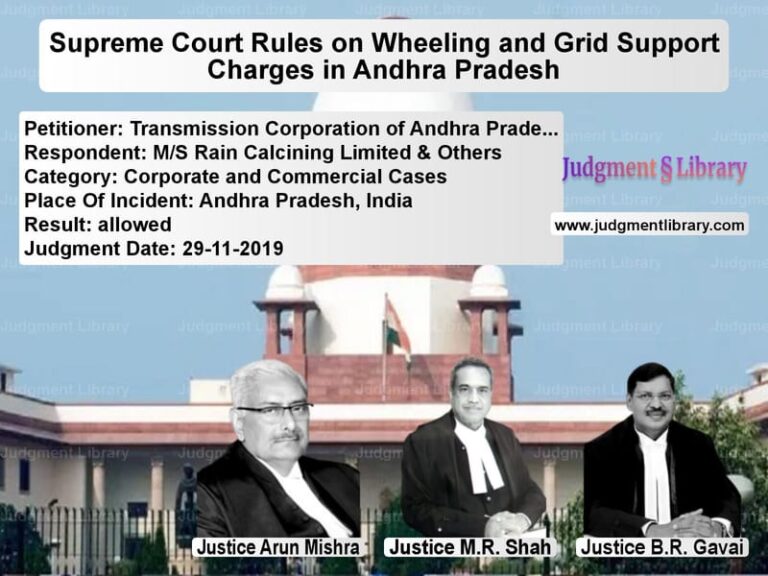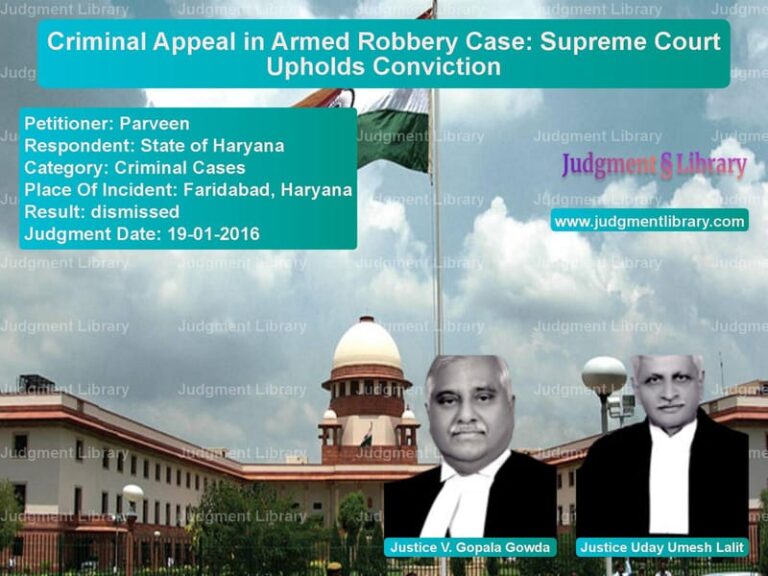Supreme Court Strikes Down State-Specific Tender Condition: Landmark Ruling on Level Playing Field
In a landmark judgment that reinforces the constitutional principles of equality and freedom of trade, the Supreme Court of India recently delivered a significant ruling that strikes down a controversial tender condition which restricted bidding to only those companies that had previous business experience within the state of Chhattisgarh. The case involved Vinishma Technologies Pvt. Ltd., a company with substantial experience in supplying sports kits to various state governments, which was excluded from participating in a Rs. 40 crore tender process due to a condition requiring prior local business experience. The Court’s decision highlights the delicate balance between a state’s autonomy in framing tender conditions and the constitutional rights of businesses to participate in government procurement processes without arbitrary restrictions.
The Tender Dispute and Legal Challenge
The case originated from three tender notices dated July 21, 2025, issued by the Samagra Shiksha Chhattisgarh State Project Office, Department of School Education, for the supply of sports kits to students of government primary schools, upper primary schools, and high and higher secondary schools across Chhattisgarh. The tender involved supplying sports kits to 5540 cluster resource centers situated across all 33 districts in the state, with a total contract value of approximately Rs. 40 crore across the three tenders.
The appellant company, Vinishma Technologies Pvt. Ltd., claimed to have extensive experience in supplying sports kits to various state governments including Bihar, Karnataka, Gujarat, and Government of NCT Delhi. However, the company found itself ineligible to participate in the Chhattisgarh tender due to condition No. 4 in the tender document, which stated: “Bidders must have supplied sports goods worth at least Rs. 6.00 crores (cumulative) to State Government agencies of Chhattisgarh in the last three financial years (2021-22, 2022-23, 2023-24 or 2022-23, 2023-24, 2024-25).”
The appellant company submitted a representation on July 29, 2025, challenging this condition, but received no response from the authorities. Consequently, the company filed three writ petitions before the Chhattisgarh High Court challenging the validity of the impugned tender conditions. During the pendency of these petitions, the state authorities deleted some other contested conditions through a corrigendum dated August 7, 2025, but retained condition No. 4 regarding past performance within Chhattisgarh.
The High Court’s Decision and Subsequent Appeal
The Division Bench of the Chhattisgarh High Court, through orders dated August 11, 2025, and August 12, 2025, dismissed the writ petitions filed by the appellant company. The High Court held that the impugned eligibility condition regarding past performance was similar in nature and purpose to the condition upheld by the Supreme Court in Association of Registration Plates v. Union of India. The High Court also noted that the state had demonstrated that similar tender conditions were prevalent in other states such as Gujarat, Assam, Delhi, Odisha, and Jharkhand. Interestingly, the Court observed that the appellant company itself had been awarded a contract containing a similar condition in the state of Jharkhand.
The High Court rejected the challenge to the impugned tender condition on grounds of discrimination and unreasonableness, holding that “State is entitled to prescribe the condition in the impugned tender notices, to ensure that selection of the most capable and reliable bidder takes place, to execute the public project of significant scale, sensitivity and public importance.” The Court further held that the impugned tender condition was neither violative of Article 14 nor Article 19(1)(g) of the Constitution of India and related to the legitimate object of ensuring technical competence, financial strength, operational capacity, and long-term reliability of the successful bidder.
Arguments Before the Supreme Court
Aggrieved by the High Court’s decision, the appellant company approached the Supreme Court. The learned Senior Counsel for the appellant submitted that “High Court has failed to appreciate that decision of this Court in Association of Registration Plates (supra) has no application to the obtaining factual matrix of the case and therefore, erred in placing reliance on the said decision while deciding the writ petitions.” The counsel further argued that “the impugned tender condition which prescribes that bidders must have supplied Sports Kits worth at least Rs.6.00 crores (cumulative) to State Government agencies of Chhattisgarh in last 3 financial years is violative of Articles 14 and 19(1)(g) of the Constitution of India, as it excludes competent suppliers from outside the State and discourages wider participation and fosters cartelisation.”
On the other hand, the learned Senior Counsel for the respondents defended the impugned tender condition. He submitted that “the tendering authority is well within its power to frame the impugned tender condition. It is further submitted that in view of geographic/social conditions of State of Chhattisgarh, the impugned tender condition is incorporated to safeguard timely delivery, ensure quality compliance and prevent supply chain disruptions.” The respondents also pointed out that financial bids had already been opened on August 21, 2025, and successful bidders had been identified. They urged that interference by the Court would necessitate re-tendering, which would consume considerable time and cause a substantial portion of the academic year to be forfeited.
The State of Chhattisgarh additionally justified the condition by arguing that “the impugned tender condition has been incorporated with an object to ensure that successful bidder has the knowledge of the topography of the State of Chhattisgarh which is a Naxal affected State, so that Sports Kits could be timely delivered to the children of Government Schools in the State.”
The Supreme Court’s Legal Analysis
The Supreme Court bench comprising Justices Sanjay Kumar and Alok Aradhe conducted a thorough analysis of the constitutional principles governing tender conditions. The Court began by reiterating the well-settled contours of judicial review in tender matters, citing the landmark judgment in Ramana Dayaram Shetty v. International Airport Authority of India, which held that “discretion of the Government in granting the largesse, is not unlimited and the Government cannot give or withhold largesse in its arbitrary discretion or at its sweet will.”
The Court emphasized that “It is well settled in law that Government must have free hand in setting the terms of the tender and the Court cannot strike down the terms of the tender prescribed by the Authority merely because it feels some other terms in the tender would have been fairer, wiser or more logical.” However, the Court also noted that “unless the action of tendering authority is found to be arbitrary and malicious the Court would not interfere” and that “a Court cannot sit over judgment on what should be the eligibility criteria in the tender notice unless the same is arbitrary, discriminatory or actuated by mala fides.”
The Court particularly focused on the doctrine of level playing field, noting that “The doctrine of level playing field is an important concept while construing Article 19(1)(g) of the Constitution of India. Article 19(1)(g) confers Fundamental Right to carry out business to a company, it is entitled to invoke the doctrine of level playing field which is however, subject to public interest. The doctrine of level playing field provides the space within which equally placed competitors are allowed to bid so as to subserve larger public interest.”
The Court’s Reasoning on Constitutional Violations
The Supreme Court found that the impugned tender condition created an artificial barrier against suppliers who had no past dealings with the State of Chhattisgarh. The Court powerfully stated that “The doctrine of level playing field requires that all equally placed competitors must be given an equal opportunity to participate in trade and commerce. It is designed to prevent the State from skewing the market in favour of few by erecting artificial barriers. In the instant case, the impugned tender condition has the effect of excluding bidders who though otherwise financially sound and technically competent, have no experience of supply of sports goods to the State Government agencies of Chhattisgarh in past three years.”
The Court further observed that “The State by linking the eligibility criteria with past local supplies has created an artificial barrier, against the suppliers who had no past dealing with the State of Chhattisgarh. The impugned condition curtails the fundamental rights of the bidders, who have been ineligible to participate in the tenders.”
Addressing the object of public procurement, the Court noted that “The object of public procurement is to secure quality goods and services for the benefit of public exchequer. The said object can be achieved by requiring the bidders to demonstrate financial capacity, technical experience, and past performance in contracts of similar nature, regardless of place of performance of the contract. To confine the eligibility to participate in the tender, within one State is not only irrational but is also disproportionate to the goal of ensuring effective delivery of Sports Kits.”
The Court categorically held that “Such a restriction, therefore, cannot be justified as reasonable within the meaning of 19(6) of the Constitution of India. The State while it enjoys the freedom to prescribe the conditions in the tender, cannot exercise that power in a manner that infringes upon constitutional guarantees, by closing the market to outsiders without just cause.”
Rejection of State’s Justifications
The Supreme Court specifically rejected the State’s justification that Chhattisgarh being a Maoist-affected area necessitated the restrictive condition. The Court provided three compelling reasons for rejecting this argument: “Firstly, the tender in question is not for security sensitive equipment but is for supply of Sports Kits which does not involve, any special risk or security repercussions. Secondly, only some districts of Chhattisgarh are affected by Maoist activities, and it is incorrect to treat the entire State, as uniformly affected by Naxalites, for exclusion of other eligible bidders. Thirdly, a successful bidder, who may not be conversant with the topography can engage a local supply chain to supply the Sports Kits.”
The Court concluded that “The impugned tender condition excludes the competent and experienced suppliers, who may have executed contracts of far greater magnitude in other States or for the Central Government departments, from participating in the tender and has the impact of promoting cartelisation. The impugned condition operates as a closed door to outsiders and restricts the wider participation of bidders and restricts competition. The impugned tender condition, therefore, is violative of Article 14 and also offends Article 19(1)(g) of the Constitution of India.”
The Final Judgment and Its Implications
In its conclusive ruling, the Supreme Court declared that “impugned tender condition is arbitrary, unreasonable and is discriminatory. The same does not have any rational nexus to the object of ensuring effective supply of Sports Kits to the children in State. It offends the mandate of Article 14 and freedom of trade guaranteed by Article 19(1)(g) of the Constitution of India.”
The Court accordingly quashed and set aside the High Court’s orders as well as the impugned tender notices, while clarifying that “respondents are at liberty to issue fresh notices inviting tenders.”
This landmark judgment represents a significant reinforcement of constitutional principles in government procurement processes. It establishes that while states have considerable autonomy in framing tender conditions, they cannot create artificial barriers that violate the fundamental rights of businesses to participate in trade and commerce. The decision strengthens the doctrine of level playing field and serves as a crucial check against protectionist tendencies that could lead to cartelization and reduced competition in public procurement. By ensuring that all qualified bidders, regardless of their previous business within a particular state, can participate in tender processes, the Supreme Court has upheld the constitutional vision of a unified economic space where businesses can compete fairly across state boundaries.
Petitioner Name: Vinishma Technologies Pvt. Ltd..Respondent Name: State of Chhattisgarh & Anr..Judgment By: Justice Sanjay Kumar, Justice Alok Aradhe.Place Of Incident: Chhattisgarh.Judgment Date: 06-10-2025.Result: allowed.
Don’t miss out on the full details! Download the complete judgment in PDF format below and gain valuable insights instantly!
Download Judgment: vinishma-technologie-vs-state-of-chhattisgar-supreme-court-of-india-judgment-dated-06-10-2025.pdf
Directly Download Judgment: Directly download this Judgment
See all petitions in Fundamental Rights
See all petitions in Constitution Interpretation
See all petitions in Public Interest Litigation
See all petitions in Contract Disputes
See all petitions in Corporate Compliance
See all petitions in Judgment by Sanjay Kumar
See all petitions in Judgment by Alok Aradhe
See all petitions in allowed
See all petitions in Quashed
See all petitions in supreme court of India judgments October 2025
See all petitions in 2025 judgments
See all posts in Constitutional Cases Category
See all allowed petitions in Constitutional Cases Category
See all Dismissed petitions in Constitutional Cases Category
See all partially allowed petitions in Constitutional Cases Category







